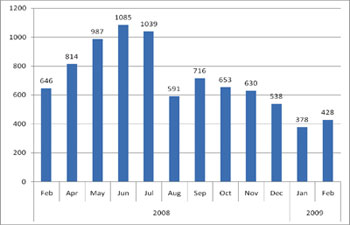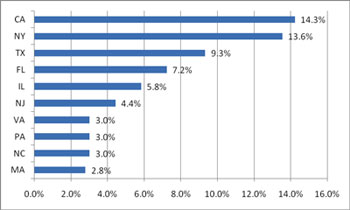The Changing Face of Online Job Postings
March 2009 Job Barometer Update
If the three keys to real estate value are location, location, location, then surely the three keys to career advancement or securing a great new position are networking, networking, networking. Once you’ve covered the obvious – your Rolodex, your school chums, and your golf connections – where else can you turn to expand your web of connections? Too often, professionals pondering a career change ignore or fail to fully exploit the opportunities offered by their industry association meetings. For the properly prepared networker attending industry meetings can be one of the most efficient and cost-effective parts of a career development strategy. Real Estate industry events offer numerous opportunities for professional development and targeted networking.
With unemployment nearing 8%, commercial bankruptcies and residential foreclosures abounding, stock market valuations reaching their lowest point in years, and no end in sight, the SelectLeaders/Cornell Job Barometer Update offers little good news on the harsh reality of what the job outlook for this country has become. What can be provided is a unique insight into the current job posting marketplace as well as offering “point-you-in-the-right-direction” advice for finding the ever-elusive commercial real estate job position.
What is happening with commercial real estate job postings in the online universe? Since June 2008, when postings reached their peak at 1,085, to January 2009, current commercial real estate job postings have plummeted over 65% (see Figure 1). In real terms, this translates into a loss of 707 available real estate positions at a single point in time from peak to trough. This drastic decrease makes intuitive sense, as the newspapers are full of articles indicating a clear downturn in the real estate markets nationwide. With declines in the number of jobs throughout the nation, it is evident that no market, no matter how insulated, has completely escaped the negative effects of Wall Street’s cataclysmic financial failure.
Figure 1: Commercial Real Estate Job Postings (February 2008 to February 2009)

Source: New postings of commercial real estate positions on key job boards from February 2008 to February 2009 (March excluded due to lack of data); Base = 8,505 postings.
Now, where are you most likely to find that next commercial real estate job? California, New York, and Texas lead the way and account for 37% of all job postings in the month of February 2009 (see Figure 2). In fact, these three states will most likely continue to be the top online posters as, historically, they have been the top three states for commercial job postings in 10 out of the last 11 months.
Figure 2: Top 10 States Posting in February

Source: New postings of commercial real estate positions on key job boards from February 2008 to February 2009 (March excluded due to lack of data); Base = 8,505 postings.
Almost 40% of all commercial real estate job postings are coming from three states-that’s huge! But what does that 37% actually represent? In real terms, it equals 159 actual real estate jobs that employers are seeking to fill through online postings in those three states in February. Do we really believe – even in this bleak job market – that there are only 159 commercial real estate jobs needed in these three large states and only 428 in the entire country? No. There is certainly a more logical explanation behind this paradox.
ComScore, Inc. recently conducted a study of Americans’ usage of online search engines and found that job search was the fastest growing content site category in 2008 (for the complete article, see Job Search Online Fastest Growing Category at www.comscore.com). With millions of unemployed Americans and many struggling to make ends meet, the number of unique visitors to this category grew over 50% (18.8 million visitors) since last year.
“While much of the U.S. economy is suffering, job search has performed significantly better than the average web site during these challenging times … Americans are turning online for this assistance, now more than ever,” said Jack Flanagan, executive vice president of ComScore.
This report-highlighting the dramatic increase in the number of unique visitors searching for jobs online-seems to be at odds with the Job Barometer data that shows commercial real estate job postings plummeting by 60% from June 2008 to February 2009. How can this possibly make sense? One reason that explains this phenomenon, which surely frustrates online job sites that earn revenue from each job that an employer posts to their site, is basic market economics: supply (meaning those who are seeking jobs) is increasing, and employers recognize this.
Never before have so many Americans flocked to job web sites looking for employment salvation. The supply of willing, and, for the most part, very well-qualified employees, dwarfs the number of available jobs in the marketplace. That is a fact that no one is disputing. It’s also believable that the total commercial real estate jobs in the country is far greater than the 428 jobs that the SelectLeaders/Cornell Job Barometer research team found on the eight major real estate online job boards during the month of February. The question is: with millions of interested job seekers flooding these job sites searching for work, why don’t employers post more of their jobs online?
We discussed this issue with the founder of SelectLeaders, the leading real estate job site network, Tony LoPinto. “Employers are inundated with job seekers trying to contact them. We are seeing more and more jobs being listed as ‘confidential’ with no company listed,” said LoPinto. “Of course, some of these confidential listings are occurring because employers are taking advantage of the incredible talent pool and pruning some of their employees, but, by far, this trend is occurring because even the best HR professionals can’t get back to all the job seekers contacting them.”
“The real news, and a clue to why it is bad, but maybe not as bad as you report, is Resume Search,” LoPinto continued. “Today, 50% of the jobs never get posted. Employers turn to resume search before posting a job. This is why SelectLeaders is about to launch Resume Search this March. I believe Resume Search would be a small part of the explanation for the drastic decrease in postings.”
This is one explanation of why, even though millions of job seekers are online looking for employment, employers are not posting all of their jobs online. Resume Search costs more than a job posting and requires know-how of resume database search on behalf of a recruiter. While a job posting may cost $400 for 60 days, limited access to a resume database starts at $600 per month. If you ask a recruiter “Why resume search?” you will likely hear about hundreds of job applications, many unqualified, coming in overwhelming numbers to each job posting.
This SelectLeaders/Cornell Job Barometer Update started off by mentioning that the reader would learn about the job posting environment and also receive some general advice about where to find that next commercial real estate job. The first piece of advice is: Get off the computer and start networking.
The Wall Street Journal recently wrote an article about online job boards entitled: Experts Weigh in on Job Boards, by Sarah E. Needleman. One piece of sage advice was, when it comes down to the best use of your time and resources, invest heavily in networking and less time searching employment boards, recommends Roy Cohen, a career counselor in New York.
And if you can’t get up the nerve to get out there and network, go back to your computer, but this time with a focus. Industry-specific job sites are more effective for experienced professionals than Monster, CareerBuilder, and Hot Jobs, according to Michael Mellone, senior consultant at Boston-based outplacement firm, ClearRock. In the context of real estate, these industry-specific jobs sites would include SelectLeaders, CoreNet Global, and ICSC, BOMA or ULI to name a few. You will be able to use your time much more efficiently by visiting these sites, uploading your resume, and searching for jobs, than at the larger, less specialized online job boards.
If you are looking for a little more help, consider Job Coaching. Some of the job boards are offering this premium service for candidates. SelectLeaders differentiates theirs by teaching candidates how employers search, and they critique a candidate’s resume with the intent of moving it to the top of the pile when employers use resume search. Others offer Career Coaching on alternative paths and employment options.
In summary, the commercial real estate job market doesn’t look promising in the near future. In your job search, use your time wisely by networking first and then searching industry-specific sites for jobs. Don’t forget to upload your resume and make it searchable to employers (you can always keep your name and employer confidential), so that HR professionals have a chance to review it without you even knowing it. Who knows, the next job offer you get might be for a job that you didn’t even know existed.


